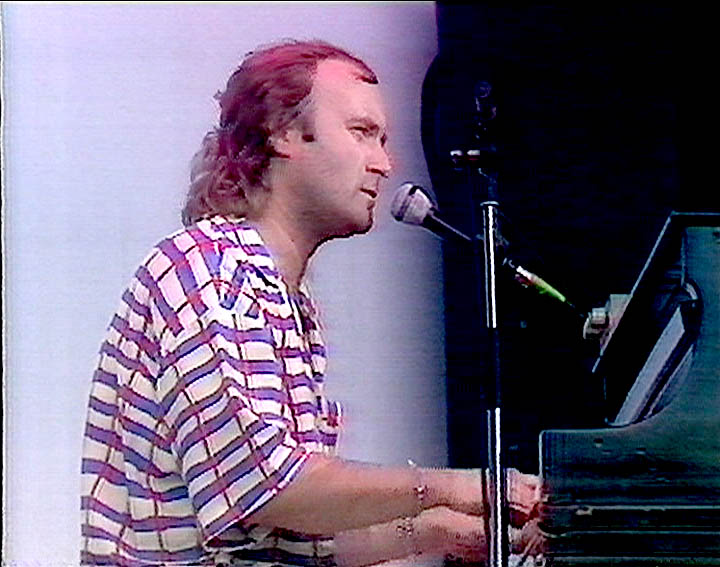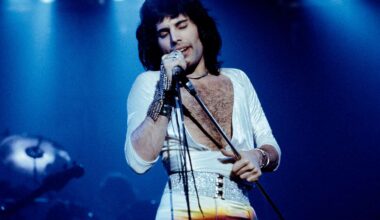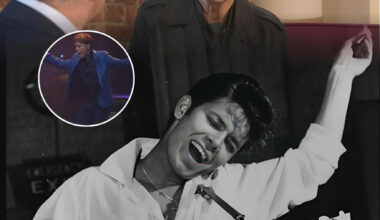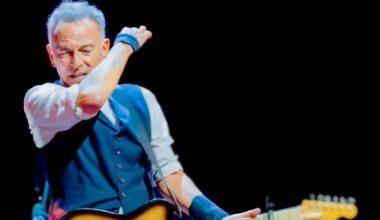There are concerts. There are fundraisers. And then there was Live Aid — the day music didn’t just entertain but tried to heal the world. On July 13, 1985, over 1.9 billion people across 150 countries tuned in to witness what would become the most ambitious, star-studded, and emotionally charged concert event in rock history.
And in the middle of that whirlwind, in a moment both intimate and colossal, Phil Collins sat alone at a piano in London’s Wembley Stadium, with 72,000 people watching him in person — and billions more through their screens — and sang the aching first notes of “Against All Odds.”
For many, that performance remains one of Live Aid’s quietest yet most unforgettable highlights. Because while other artists blasted through anthems with full bands and roaring crowds, Phil Collins gave the world a ballad. A heartbreak. A hush. A prayer disguised as a song.
The Calm Before the Storm
It was a sweltering afternoon in London. The energy was wild — Queen would soon take the stage in what would become the most famous rock performance of all time, U2 had just blown everyone away with a show-stopping rendition of “Bad,” and the Wembley crowd was riding high on adrenaline.
Then came a pause.
A single spotlight hit the stage. The cameras zoomed in. And there he was: Phil Collins, dressed modestly in a white shirt and slacks, no theatrics, no entourage — just a grand piano and a face the world already knew from his chart-topping solo career and as the frontman of Genesis.
The hush that fell over Wembley was instant. For a few surreal minutes, it felt like time froze.

A Voice Cracked with Feeling
He began to play the soft, almost trembling opening chords of “Against All Odds (Take a Look at Me Now)”, and within seconds, something in the air shifted. It was as if the entire audience — both at Wembley and around the globe — leaned in.
Then his voice came in. Vulnerable. Steady. Brimming with emotion.
“How can I just let you walk away, just let you leave without a trace?”
The words hit hard — not just because of the song’s timeless heartbreak, but because of the context. Live Aid wasn’t about lovers lost; it was about millions of lives at risk, a famine in Ethiopia so devastating that the world’s biggest stars dropped everything to help.
And here was Collins, singing about loss — personal, emotional, human — in a way that somehow mirrored the global grief. It was personal and universal all at once.
He wasn’t trying to steal the show. He wasn’t trying to make a statement. But he made one anyway.
From London to Philadelphia — In the Same Day
Phil Collins’ appearance at Live Aid was more than just powerful — it was logistically unbelievable. After performing “Against All Odds” and later “In the Air Tonight” in London, Collins boarded the Concorde — the legendary supersonic jet — and flew across the Atlantic to perform again in Philadelphia at JFK Stadium just hours later.
He became the only artist to perform at both the UK and US Live Aid concerts on the same day.
That alone cemented his place in Live Aid legend. But it was that simple, stripped-down ballad in London that people remember — because it felt real.
Why It Still Hurts (In the Best Way)
Watching that performance now — grainy on YouTube or restored in documentary cuts — you feel something rise in your throat. Maybe it’s nostalgia for the ’80s, or for a time when music felt like it could actually change something. Maybe it’s the rawness in Collins’ delivery, the way he closes his eyes when the pain hits, or the subtle crack in his voice during the final chorus.
Or maybe it’s because “Against All Odds” wasn’t just about one heartbreak anymore. That day, it became a quiet anthem for every kind of loss — of lives, of hope, of innocence. And somehow, in the middle of all the noise and spectacle, that small moment at a piano reminded us of the fragile, beautiful urgency of what Live Aid was all about.

Legacy Etched in Light and Silence
Today, “Against All Odds” remains one of Phil Collins’ most enduring hits. But ask a true music fan where it reached its peak, and they’ll point to Live Aid.
Because for all the fireworks, the guitar solos, the iconic Freddie Mercury fist pumps and Bowie duets, it was this: a man, a piano, and a truth too deep for shouting — that stole hearts.
And for those who were there, or watching from their living rooms around the world, they’ll tell you: for a moment, the world didn’t feel so broken.
A Reminder We Still Need
Live Aid was about giving. About unity. About waking up to the suffering of others. And in the middle of that, Phil Collins gave us something just as precious: a few minutes of emotional stillness in a world on fire.
That’s the power of a real artist. Not just to be heard, but to be felt.
And in 1985, with “Against All Odds,” Phil Collins didn’t just sing a song — he gave the world a mirror.
A mirror to our grief. A mirror to our hope. A mirror to the fragile human connection we too often forget.

“Take a look at me now…”
He sang it, not as a demand, but as a plea.
And that day, the world did.
Author’s Note:
As we revisit these moments 40 years later, may we remember not just the stars and the songs — but the reasons behind them. And may we always find space, even in the loudest rooms, for the quiet truths that make us human.






